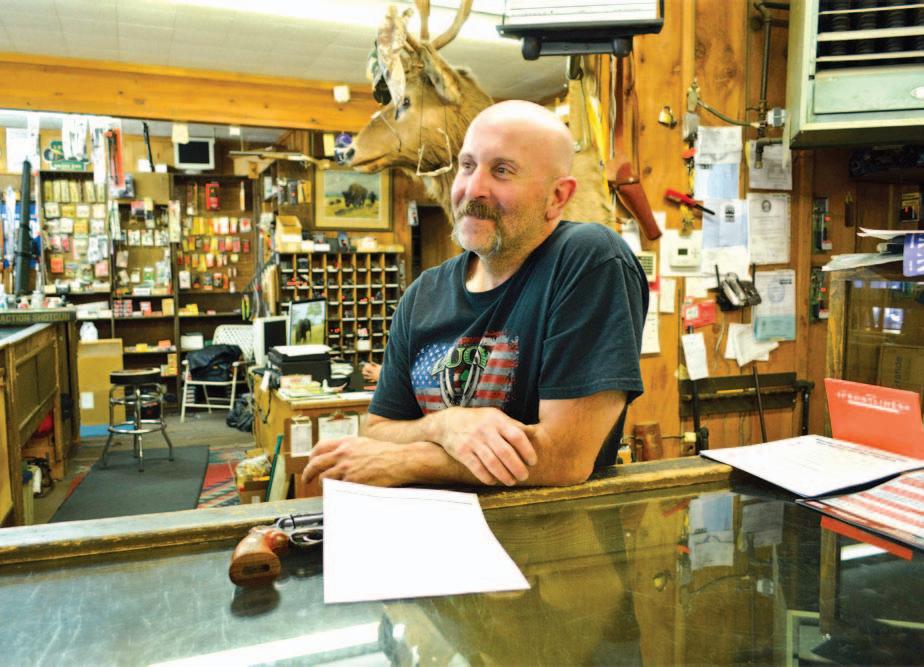
10 minute read
News
from June 30, 2016
Alternatives keep gaining
Last week we reported the shutdown of two nuclear power plants in Illinois, relieving pressure for the proposed Yucca Mountain dump for nuclear wastes.
Advertisement
Then, on June 21, Pacific Gas & Electric (PG&E) announced the 2025 shutdown of the massive Diablo Canyon reactors in California. The lost power will be made up by renewable energy. PG&E later withdrew its license renewal application for the facility.
The shutdown made headlines around the world because of the prominent role the Diablo plant has played in the history of nuclear power. Environmental journalist Harvey Wasserman, who has tracked the industry for more than four decades, wrote last week, “On a global scale, in many important ways, this marks the highest profile step yet towards the death of U.S. nuclear power and a national transition to a Solartopian green-powered planet.”
The International Brotherhood of Electrical Workers came away with retraining guarantees. There were reports that the environmental groups Friends of the Earth and Natural Resources Defense Council had roles in negotiating the shutdown arrangements. All this happened shortly after the Wall Street Journal claimed there was growing support among greens for nuclear power.
Reid’s candidates
For reasons unknown, U.S. Sen. Harry Reid, the Democratic floor leader, has been deeply involved in the Florida Democratic U.S. Senate primary. He has been promoting U.S. Rep. Patrick Murphy over U.S. Rep. Alan Grayson, issuing a statement in February claiming that Grayson has “no moral compass” and “used his status as a congressman to unethically promote his Cayman Islands hedge funds.”
Grayson responded to that statement by confronting Reid at a meeting of the Congressional Progressive Caucus, asking in a room full of people if the Nevadan even knew him: “Say my name, senator. Say my name.” Whether Reid knew who he was initially or not, he did figure it out and told Grayson, “I want you to lose. It’s true.”
Grayson later said, “I have a low opinion of Reid’s low opinion.”
It’s just as well that Grayson stayed in the race. The campaign of Murphy, the supposedly safe choice, has been imploding in the wake of a report by WFOR News in Miami: “Portraying himself as an experienced CPA and small business owner has always been critical to the political persona created for his [Murphy’s] campaigns. They conveyed a sense of seriousness and stability which he otherwise lacked. A CBS4 News investigation into Murphy’s history as both a CPA and a self-described small business owner, however, shows Murphy ... has never worked a day in his life as a certified public accountant. And he was never a small business owner.”
There were previous reports that Murphy exaggerated his education and made false claims about his role in the BP oil spill cleanup. He is also facing a major complaint before the Federal Elections Commission.
An opinion survey taken just before the WFOR report showed Grayson leading Murphy 30 to 27 with a whopping 38 percent undecided.
In 2009, during wide criticism of Reid’s failure to do anything about the “silent filibuster” requiring supermajorities in the Senate without senators actually having to filibuster, Grayson posted an online petition calling for an end to the practice (“Florida lawmaker wants filibuster reform,” RN&R, Dec. 10, 2009).
Other primaries Reid has involved himself in: • In 2006, Reid helped force Iraq war veteran Paul Hackett out of the Ohio U.S. Senate primary race in favor of competing Democrat Sherrod Brown, who won (“Friendly fire,” RN&R, Feb. 23, 2006). • In 2012 Reid forced Democrat Byron Georgiou out of the Nevada Democratic primary for U.S. Senate to protect the candidacy of Shelley Berkley, who went on to lose. • In this year’s Nevada U.S. Senate race, Reid cleared the way for Catherine Cortez Masto, effectively warning off other Democrats like Dina Titus. Republican Joe Heck now calls Cortez Masto “Harry Reid’s candidate” in campaign advertising. —Dennis Myers
Aim for the truth
In November, Nevadans will vote on whether or not to implement new background by check requirements for certain types Jeri of firearm transfers. At its most Chadwell-Singley basic level, Question 1—the Nevada background check initiative—will determine whether or not an individual without a federal firearms license (FFL) must undergo a background check when receiving a gun from another unlicensed person.
It’s a good idea to read the actual initiative, not rely on the advocates and opponents
Read the initiative for yourself: nvsos.gov/ Modules/ShowDocument. aspx?documentid=3440
Nevadans for State Gun Rights: nevadansforstategunrights. org
Safe Nevada: safenevada. org
The exchange of a gun between unlicensed people is commonly referred to as a “private party transfer” and currently does not require a background check when conducted between two Nevada residents. But the ballot initiative is not as simple as voting “yea” or “nay” on requiring background checks on private transfers. That’s because the definition of a transfer covers more than just the sale of a gun. It also includes gifts, inheritances and the temporary lending of firearms for purposes such as self-defense, hunting and trapping, target-shooting, and organized firearms competitions and performances.
Question 1 would apply the background check rule differently to the various types of transfers based on several factors like a familial relationship between two unlicensed people.
Before delving into the ways groups on each side of the debate are presenting the details of the initiative in an effort to win support, it helps to first become acquainted with—or refreshed on—how the initiative landed on the ballot for a vote by the general electorate.
This particular gun control proposal has been in and out of the news and plastered across pro- and anti-gun websites for more than three years. What is now Question 1 on the 2016 ballot was first Senate Bill 221 of the 2013 session of the Nevada Legislature. The bill passed through both houses by narrow margins late in the session and was delivered to the Gov. Brian Sandoval for approval on June 6, 2013.
Five days later, the Las Vegas Sun reported that in one day alone there had been “44,000 calls—33,000 of them against the bill” made to the governor’s office. Sandoval vetoed the bill on June 13, 2013, citing in his veto letter a number of the bill’s components as imposing “unreasonable burdens and harsh penalties upon law-abiding Nevadans.”
However, a 2014 petition drive led by the group Nevadans for Background Checks collected enough signatures to place the measure back before the Legislature during the 2015 session, this time as a citizens’ initiative. In the interim, the Legislature
When prospective firearms buyers visit a federally licensed dealer, like Joe Compilli, who owns Silver State Arms, they must fill out a form called an ATF 4473 and undergo a background check before they can purchase a gun.
had flipped to a Republican majority in the 2014 election. The legislature’s decision not to approve the petition (in this case by ignoring it entirely) within 40 days immediately qualified the measure for a popular vote in the 2016 general election.
Media coverage concerning the initiative slowed for a time after the March 13, 2015 announcement that it would appear as a ballot question in 2016. Now, coverage surrounding the initiative is picking up again as candidates for local and state offices voice their stances on the matter and groups on both sides of the background check debate attempt to sway voters to their respective sides in the lead-up to November’s election.
There are two political action committees registered with the Nevada Secretary of State’s office in regards to Question 1—Safe Nevada in support of the initiative, and Nevadans for State Gun Rights in opposition to it. By comparing the information presented on the PACs’ respective campaign websites to the wording of the actual initiative petition, it’s clear that each group has presented at least some information that doesn’t portray the initiative’s intentions accurately. To demonstrate this, one statement was chosen from each PAC website for comparison to the actual text of the initiative.
Background checks conducted by FFLs in Nevada are done by calling the Nevada Department of Public Safety’s Records Bureau. The Records Bureau checks state criminal records and also the FBI’s National Instant Criminal Background Check System (NICS). Nevada FFLs don’t contact NICS directly because the FBI and the state developed a Point of Contact Firearms Program, which according to the Department of Public Safety’s website “has access to Nevada criminal records unavailable to agencies outside of the state, as well as the national records.” Nevada is one of 13 states that are full participants in the POC program.
The text of the initiative petition that concerns how a licensed dealer would conduct a background check for a transfer or sale between two unlicensed individuals states that the dealer would “comply with all requirements of federal and state law as though … selling or transferring the firearm from his or her own inventory,” except for one key difference. The dealer would have to contact NICS directly instead of the state POC program.
Safe Nevada reiterates this difference on its website but makes
no mention of an issue arising from this change. According to Records Bureau Chief Mindy McKay, the state’s designation as a POC for the NICS program means that FFLs cannot contact NICS directly. McKay explained that before FFLs would be allowed to contact NICS directly, the state would have to work with the FBI to change the existing protocol. This would mean Nevada would no longer be a full participant in the FBI’s POC program, and that background checks for private party transfers would not include any Nevada criminal records not available to agencies outside of the state.
An example of an inaccurate assertion on the Nevadans for State Gun Rights’ website concerns the process unlicensed individuals would have to go through when transferring a firearm through a federally licensed firearm dealer. The website states:
“This proposed bill requires you to surrender your firearm to a Federal Firearms Licensee (FFL), who is regulated by federal bureaucrats. You must pay them a fee to sell your gun. If your firearm does not transfer, you must pay the federal fee to have the background check run on you before you get your gun back.”
Again, looking at the wording of the actual petition shows that this information is incorrect. The wording of the initiative that covers background checks by FFLs clearly states that “the seller or transferor may remove the firearm from the business premises while the background check is being conducted, provided that” the seller and the buyer both return to the licensed dealer before completing the sale or transfer. The federal regulations covering private transfers also allow the seller to keep the gun in his or her possession but do stipulate that if the gun is left in an FFL’s possession, a background check would be required to retrieve it.
Each of the PACs has misrepresented at least one of the facts behind Question 1. Luckily, with more than four months until the election, Nevada voters still have time to learn for themselves exactly what the background check initiative would and wouldn’t do. Both PAC websites and the Nevada Secretary of State’s website provide links to the text of the initiative petition for those willing to take a closer look. Ω
A veto and legislative indifference gave way to a popular vote
Cat nap

El Santo, the jaguar, was taking a little nap on June 18 while visitors to the Animal Ark wildlife sanctuary hustled past his enclosure on their way to watch animal keepers feed Gracie the bear. Jaguars are the largest cat in the Americas. El Santo was donated to Animal Ark by Project Survival’s Cat Haven to help raise awareness about this endangered species.

THURSDAYS JUNE 9 - AUGUST 25 4 PM - 9 PM
FOOD TRUCKS BEER GARDEN












